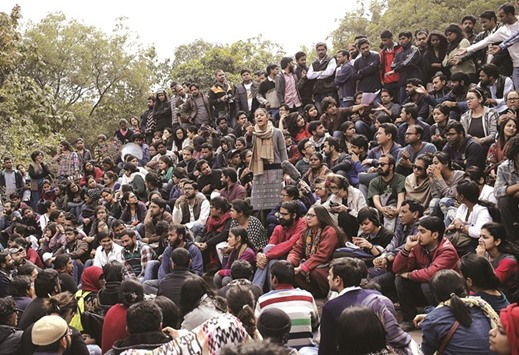
Students of Jawaharlal Nehru University attend a protest inside the university campus yesterday.
India’s biggest nationwide student protests in a quarter of a century spread across campuses yesterday after the arrest of a student accused of sedition, in the latest battle with Prime Minister Narendra Modi’s government over freedom of expression.
Outrage over the arrest of the leftwing student leader, who had organised a rally to mark the anniversary of the execution of a Kashmiri separatist, has led to demonstrations in at least 18 universities.
In the largest protest, thousands of students and academics at New Delhi’s prestigious Jawaharlal Nehru University (JNU) boycotted classes and erected barricades for a fourth day in an escalating conflict with the authorities.
“The government does not want students to have a say,” said Rahila Parween, vice-president of the Delhi unit of the All India Students’ Federation, a leftwing student union. “It wants to dictate what students think, understand and say.”
The incident marks another flare-up in an ideological confrontation between Modi’s Bharatiya Janata Party government and leftwing and liberal groups that is prompting critics to compare it with Indira Gandhi’s imposition of a state of emergency in the 1970s to crush dissent.
Members of BJP accused the student leader, Kanhaiya Kumar, of “anti-India” sentiment. One BJP lawmaker said the university, which has a tradition of leftwing politics, should be shut down.
“I can assure you that every action we take is to protect our country. Any anti-India activity will not be tolerated,” BJP president Amit Shah, one of Modi’s closest allies, said at party headquarters.
Protests spread when Kumar was arrested last week for sedition, after giving a speech questioning the hanging in 2013 of Mohamed Afzal Guru over his role in the 2001 attack on parliament.
Activists have long questioned Guru’s conviction, and the Supreme Court has described the evidence against him as circumstantial.
Kumar was brought before a judge yesterday, but violent scuffles broke out in the courtroom where fellow students and journalists had gathered to witness his appearance.
Witnesses said men wearing lawyers’ robes snatched reporters’ phones and notebooks and pushed them to the ground, accusing them of being “pro-Pakistan” and “anti-Indian”.
Several journalists said they had been threatened and ordered to leave the court. Television footage showed unidentified men punching and shoving people outside the court building.
JNU students said yesterday they would boycott classes until Kumar was released.
Delhi Police Commissioner B S Bassi defended the decision to arrest Kumar, saying the student had “raised anti-India slogans and that’s why he has been arrested”.
He played down yesterday’s violence after media accused police in court of doing little to stop it, saying that “to my knowledge nobody has received any serious injuries”.
A leader of the student group that is aligned with the BJP said freedom of expression should not be misused to justify acts that could harm the country.
“You cannot be an Indian if you celebrate the death anniversary of a terrorist,” said Saurabh Sharma, joint secretary of the Akhil Bharatiya Vidyarthi Parishad.
Home Minister Rajnath Singh has, meanwhile, faced ridicule for citing a fake tweet to say that the JNU demonstration had been backed by Hafiz Saeed, a Pakistani militant accused by India of being behind the 2008 attack on Mumbai in which 166 people died.
Delhi police circulated the fake tweet at the weekend in a warning to students “not to get carried away by such seditious and anti-national rhetoric”. A spokesman did not answer calls to his mobile phone yesterday seeking comment.
“The crackdown signals an utter lack of judgment in the government, where ministers manage to manufacture a national crisis out of what were always, at best, minor affectations in student politics,” Pratap Bhanu Mehta, a leading political commentator, wrote in the Indian Express newspaper.
Since Modi rose to power in May 2014, people have been attacked by Hindus enraged at reports of cows - sacred in their religion - being slaughtered, smuggled or consumed.
There has been a series of attacks on churches, while writers have returned awards in protest over the government’s silence over a series of murders of secular scholars.
At least 18 university campuses witnessed protests yesterday. Students in the eastern city of Kolkata burnt an effigy of Modi and leftwing groups in the neighbouring state of Odisha planned state-wide demonstrations.
Analysts said the student protests were the most widespread in India since the self-immolation of a young man in 1990 after the government ruled in favour of providing affirmative action to the lower castes in higher education.
“We are witnessing liberal India, particularly young people who are usually more idealistic, fighting back,” said Satish Misra, a political analyst at the Observer Research Foundation.
